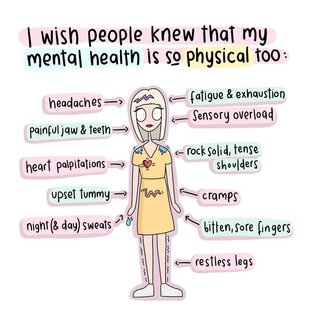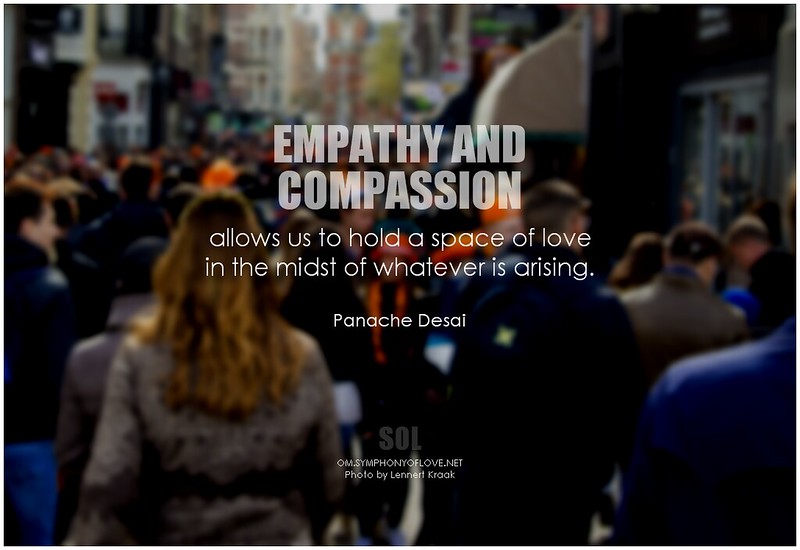|
Our body warns us when we need to pay attention whether that be physically or mentally. We have dry mouth and get tired when we don't have enough water, we have stomach pains when we're hungry, and pain when we get physically hurt. What about the signs of the effects of stress on our mental health? Here are some ways you can tell if you're stressed:
0 Comments

Today’s educational setting is often focused on teaching rigorous standards and preparing students for local and national assessments. Math, reading, history, and science are essential core subjects that are being introduced as early as pre-school. However, in order to be successful, students must develop the ability to get along with others, to work cooperatively, and to express one’s thoughts and feelings productively. These skills can be taught through social-emotional training.
While the vision and mission of schools may differ, the goal of educating students is to prepare them for life, including becoming productive citizens in the global workforce. For this reason, it is vital that students begin at an early age to develop the skills necessary for building relationships and resolving conflicts. This starts by teaching children to understand emotions, how they drive their actions, and ways the students can self-regulate to be more productive. Once students grasp their own feelings, they are able to apply that knowledge to others. Empathy is the ability to understand the emotions of another person. Because it is human nature to be self-centered, students must be taught to empathize. According to Stephen Young, a research scientist at the Center for Creative Leadership, there are three types of empathy.
Once students begin to develop empathy, they can learn ways to express kindness to build relationships with peers and adults. Kindness is doing something to make someone happy or to help them and expecting nothing in return. Students will soon discover that kind acts and empathy will help them to work cooperatively and make responsible decisions which leads to productive problem solving. Stress is inevitable, especially during times of crisis and uncertainty. But that doesn't mean you can't work to eliminate some points of tension in your life, and learn to better cope with the stressors you can't avoid.
Here are some things that might help: 1. Get regular exercise. Breaking a sweat can take your mind off what's bothering you, and it can also counteract some of the harmful effects of stress. Practicing yoga may be especially beneficial, according to Harvard Health Publishing. 2. Spend time in nature. Sunshine and fresh air can be a powerful stress-reliever, according to the AHA. 3. Don't turn to cigarettes or heavy alcohol use. Many people turn to controlled substances for stress relief, but in the long run they will only worsen health concerns. Instead, look for healthy alternatives when you're craving a smoke or a drink. 4. Practice deep breathing. When you're stressed, you may not notice if your breathing becomes quick or erratic. Focusing on your breath can help slow your heart beat and calm your body's flight-or-fight response. 5. Say "no" when necessary. "It's important to really think about the bandwidth you have and not take on more than you can handle emotionally," Pittman says. 6. Talk to someone. If stress is interfering with your ability to be happy and productive, talk to your doctor or a mental-health professional about treatments that might help. You know the feeling: sweaty palms, racing heart, somersaulting stomach — you're stressed out, and it's taking a toll on your body as well as your mind. Psychological stress may not always have a physical cause, but it certainly can show up in physical ways.
"Stress comes from a perceived threat," Delishia Pittman, PhD, assistant professor of counseling at George Washington University and practicing psychologist in Washington, D.C., said. "When your brain detects something that could do you harm, it mobilizes the body to defend itself." Some threats are physical — like if you see a bear while walking through the woods, for example. Others are mental or emotional: Arguing with a loved one, being treated unfairly at work or awaiting the results of an important test can also be stressful, and they still jeopardize your wellbeing, even without the threat of bodily harm. "Unfortunately, your body can't tell the difference between the threat of a bear and the threat of bad test results, so it responds in the same way physiologically speaking," Aly Inclan, NP, psychiatric nurse practitioner at UofL Health, said. "The intensity of the response may vary based on threat level, but the response itself is the same." That response includes different organ systems and body parts. In fact, it's difficult to think of a part of the body that's not affected by stress in some way. Here are a few of the notable ways the body reacts to tense situations and how to protect yourself from the harmful side effects of stress. Your Senses - Stress triggers the release of hormones and chemicals in the brain that produce what's known as a "fight or flight response," Inclan says. Two of those hormones are epinephrine (also known as adrenaline) and cortisol. When epinephrine is released into the bloodstream, it dilates airways and extra oxygen is sent to the brain. This causes a heightened sense of alertness and can sharpen senses like taste, smell and hearing as well, according to Harvard Health Publishing. Of course, stress can also be a distraction. It's possible for people to be under so much stress that they don't notice smells, tastes or sights that they normally would, Pittman says. And over time, it's possible for senses like vision to be damaged by high blood pressure, which has been linked to chronic stress. Your Muscles - If you tend to clench your jaw, ball your hands into fists or otherwise tense up when you're under a lot of stress, you're not alone. These behaviors come from the action of epinephrine on our muscles, Inclan says. "Your muscles are prepared for quick action," she says. "This is the body's urge to do something to escape the perceived threat." But according to the American Psychological Association, this type of muscle tension can lead to problems like headaches, neck and back pain and even long-term injuries. Bruxism, or teeth grinding, is also a common condition linked to stress. "Often people grind their teeth in their sleep, which can wear down teeth and cause headaches, jaw pain and eye strain," Pittman says. "But I've also known people who grind their teeth or clench their jaw while they're awake as well." Your Brain - When it comes to mindset and productivity, stress can be a motivator — or a roadblock. "Some people thrive under stress and can spring into action and make things happen, and others are paralyzed by it," Pittman says. Stress has also been linked to clinical depression and anxiety, as well as cognitive issues. In a 2,000-person study published in the November 2018 edition of Neurology, young and middle-aged adults with higher levels of cortisol circulating in their bodies were more likely to have memory problems and lower brain volumes. And perhaps most obviously, stress can affect your mood. "All of that epinephrine makes you ready for action, but if there is no real threat and therefore no release of that response, then you might just feel constantly on edge or irritable," Inclan says. "Oftentimes people find that they get angry with very little provocation." Your SkinSkin is the largest organ of the body, and research shows it can be affected in numerous ways by psychological stress. According to a June 2014 review published in Inflammation & Allergy Drug Targets, stress can trigger or exacerbate inflammatory conditions such as psoriasis, atopic dermatitis (eczema) and acne. Stress has also been associated with delayed wound healing and, in some studies, premature skin aging. Then there are the more immediate effects of stress on the skin: On some occasions, stress can induce flushing and perspiration. And for some people, periods of stress can trigger behaviors like nail biting, picking or scratching. Unfortunately, these habits may not just be harmless nuisances: They can lead to irritation or even infection, according to the University of Chicago. Your Heart - A heightened fight-or-flight response raises blood pressure and causes the heart to work overtime, says Inclan. For fleeting, short-term stressors — like being nervous for a few hours before a presentation, or while watching a scary movie — this usually is not a big deal, as long as things return to normal soon after. There have, however, been reports of sudden stressors causing cardiovascular events: Broken heart syndrome, for example, is a condition that resembles a heart attack and occurs when an emotional or painful event (like the death of a loved one) causes chest pains and shortness of breath, according to the Cleveland Clinic. On a long-term basis, stress can be much more harmful to the heart and blood vessels. Elevated levels of stress hormones can lead to chronic high blood pressure, which, if left untreated, can cause artery stiffening, kidney failure and sexual dysfunction, among other complications. Chronic stress is also linked to heart disease, according to the American Heart Association (AHA). Your Immune SystemStress has been connected to other types of illnesses, too. One reason? Chronic cortisol elevation negatively affects immune system functioning, leaving the body more vulnerable to disease. "Protecting you from the flu isn't a priority when you're running from a bear," Inclan explains. Your GutMany people notice a link between how they're feeling mentally and how their stomach feels physically. In fact, this is so common that the gut is sometimes referred to as "the second brain," according to Johns Hopkins Medicine. "We know that when you're stressed, the body secretes lots of hormones, and that some of those hormones can leak into the gut and disrupt the natural flora of the digestive tract," says Pittman. "This can lead to constipation, nausea, diarrhea or even irritable bowel syndrome." Your WeightIn addition to gastrointestinal issues, stress can also dampen appetite, Pittman says. For these reasons, it can be linked to weight loss. On the other hand, for some people, feelings of anxiety and uncertainty can trigger stress eating and cravings for fatty comfort meals and sugary junk food. It's probably not surprising, then, that stress can also contribute to unwanted weigh gain, according to the Mayo Clinic. Though it's impossible to completely eliminate stress from your life, you can learn to better manage daily stressors and, in doing so, improve your overall wellbeing.
Here are some ways to help you cope: 1. Deep Breathing Breathing exercises can calm your body's fight-or-flight instincts and elicit a relaxation response, according to Harvard Health Publishing. 2. Meditation Practicing meditation, which includes deep belly breathing, can help you let go of negative emotions that may be causing you mental and physical stress, per the American Psychological Association. 3. Physical Activity Getting your body moving with regular exercise and gentle movements like yoga, tai chi and stretching exercises can be good for reducing muscle tension and beneficial for busting stress, according to the Mayo Clinic. 4. Gratitude Spending a few minutes each day practicing gratitude (think: writing down something you're grateful for) can help you feel happier, more positive and less stressed, per Harvard Health Publishing. The articial originally appeared in Livingstrong, May 30, 2020.
Sleepless nights, overeating, a weakened immune system — the more common symptoms of stress are probably familiar to you. But stress can also trigger lesser-known side effects (both mental and physical) that you might not expect. Here, Rosalind S. Dorlen, PsyD, a New Jersey-based, board-certified clinical psychologist and member of the psychiatry department at the Overlook Medical Center, shares some of the more surprising ways stress may manifest in your body. 1. ForgetfulnessIf you're feeling foggy or having a tough time focusing, stress may be the culprit, Dorlen says. Indeed, stress and anxiety can hinder your attention and your ability to retrieve memories (or even make new ones), according to Harvard Health Publishing. In fact, a November 2018 study in Neurology demonstrated that adults with higher levels of cortisol (the "stress hormone") exhibited impaired memory and lower brain volumes. 2. Skin Issues"Skin reactions like hives, viral exanthem (an eruptive skin rash), acne and cold sores seem to be an unfortunate example of collateral damage people experience under periods of extreme stress," Dorlen says. Here's why: "Stress causes our bodies to make hormones like cortisol and epinephrine, which activate skin glands to produce oiliness, which can be a factor in acne and other skin-related conditions," she says. What's more, during stressful times, we tend to neglect our usual self-care regimens (think: reduced sleep, skipping your face wash routine at bedtime, etc.) which can create or exacerbate existing skin vulnerabilities, Dorlen explains. 3. Reduced Sex DriveLost your libido? "Heightened or chronic stress can interfere with our body's hormone levels, producing greater amounts of cortisol and epinephrine, and the effect can reduce sexual interest or desire," Dorlen says. Think about it: If your body is in a constant reactive state of flight-or-fight, fear or paralysis due to stress, these conditions aren't exactly conducive to sexy time. Indeed, an October 2013 study in the Journal of Sexual Medicine discovered that high levels of chronic stress were correlated with less sexual arousal in women. The researchers concluded that psychological distraction and increased cortisol played a major role. And the physical effects of stress can be negative for men, too. According to Dorlen, "the long-term effects of stress can narrow and restrict blood flow, which is one of a number of factors associated with erectile dysfunction." Conversely, it's much easier to get in the mood when you're feeling loose and relaxed. "That may be why so many couples enjoy expanded sexual interest and participation when on vacation," Dorlen says. 4. Tight MusclesHave you suddenly noticed tension in your neck, back or shoulders? Stress may be the culprit. Our bodies deal with stress by going into fight-or-flight mode, Dorlen explains, which means releasing hormones that ready our muscles to respond to whatever is threatening us. This can be helpful in the short term (think: running from a bear), but can cause issues if we're consistently under stress. "Muscles tense up to protect themselves from injury during stressful conditions, so they may not get a chance to relax if the stress is continual," Dorlen says. And to make matters worse, stress and anxiety can intensify your perception of muscular pain and decrease your ability to cope with it, according to the North American Spine Society. 5. AngerFeeling on edge? Irritability is a common symptom of chronic and prolonged stress, Dorlen says. This may have something to do with your body's chemical reaction to stress. When your body releases chemicals in response to a perceived threat, your heart and breathing skyrocket to help you spring into action. This may have helped you flee a hungry predator back in the day, but today it might just leave you feeling tense, moody and even angry. A January 2015 study in the American Heart Journal found that high levels of anger appeared to be linked to mental distress and an increased cardiovascular risk, while another November 2015 paper in The Journals of Gerontology: Series B discovered an association between anger and stressors in caregivers. 6. Gut ProblemsAnyone who's ever experienced a "nervous stomach" knows that stress can go straight to your gut. Chronic stress can cause a whole range of GI complications, including stomachaches, constipation and diarrhea, according to Dorlen. That's because your gut and central nervous system are in constant communication, per John Hopkins Medicine. In fact, they're so intimately connected that your gut is often referred to as your "second brain." 7. HeadachesFrom spilling coffee on your shirt to losing your keys and sitting in gridlock, everyday annoyances can be a headache — literally. It goes back to that fight-or-flight response. When your body enters this state and produces hormones like adrenaline and cortisol, it causes vascular changes that prep your muscles to deal with the danger. But this chain of events can also give you a migraine or headache, according to the Cleveland Clinic. What's more, during periods of high stress, many people experience tightness in their neck, jaw and shoulders — dubbed the "tension triangle" — which only worsens tension headaches, per the Cleveland Clinic. |
AuthorWrite something about yourself. No need to be fancy, just an overview. Archives
June 2022
Categories |







 RSS Feed
RSS Feed